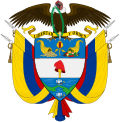| Afro-Colombian seats |
|---|
| C.C. Ancestral De Comunidades Negras Playa Renaciente | 32,243 | 8.12 | 1 |
| Consejo Comunitario La Mamuncia | 25,428 | 6.40 | 1 |
| C.C. De La Comunidad Negra De La Plata Bahía Málaga | 17,477 | 4.40 | 0 |
| Consejo Comunitario Del Rio Yurumangui | 14,048 | 3.54 | 0 |
| C.C. De Comun. Negras Palenque Vda. Las Trescientas Y Mun. Galapa | 13,122 | 3.30 | 0 |
| Consejo Comunitario Mayor De Certegui | 11,340 | 2.86 | 0 |
| Consejo Comunitario De Alejandro Duran Diaz | 8,604 | 2.17 | 0 |
| Todos Somos Colombia | 7,578 | 1.91 | 0 |
| Corporación Poder Ciudadano | 7,048 | 1.78 | 0 |
| Consejo Comunitario Renacer Negro | 6,414 | 1.62 | 0 |
| Consejo Comunitario Bocas Del Atrato Y Leoncito | 4,219 | 1.06 | 0 |
| Consejo Comunitario Ma Kankamana De San Basilio De Palenque | 4,179 | 1.05 | 0 |
| C.C. De La Comunidad Negra De La Calle Larga Rio Dagua | 3,539 | 0.89 | 0 |
| C.C. De Los Corregimientos De San Antonio Y El Castillo | 3,437 | 0.87 | 0 |
| Consejo Comunitario Los Andes | 3,391 | 0.85 | 0 |
| C. C. De La Comun. Negra De Tierra Baja Mi Territorio Ancestral | 3,325 | 0.84 | 0 |
| Consejo Comunitario Veredas Unidas Un Bien Común | 3,201 | 0.81 | 0 |
| Consejo Comunitario Imbilpi Del Carmen | 2,711 | 0.68 | 0 |
| Consejo Comunitario De La Comunidad Negra De Limones | 2,618 | 0.66 | 0 |
| Consejo Comunitario Tablon Salado | 2,225 | 0.56 | 0 |
| Fund. Afrocolombiana Liberal De Desarrollo Social (Afrocodes) | 2,162 | 0.54 | 0 |
| Kusuto Magende Cokumalu De Luruaco | 2,136 | 0.54 | 0 |
| Consejo Comunitario De Las Baras | 1,989 | 0.50 | 0 |
| Consejo Comunitario De Comunidades Negras Obatala | 1,766 | 0.44 | 0 |
| Cuenca Del Rio Iscuande | 1,667 | 0.42 | 0 |
| Org. Social De Comunidades Negras "Nelson Mandela" | 1,619 | 0.41 | 0 |
| Consejo Comunitario De Comunidades Negras Santo Domingo | 1,505 | 0.38 | 0 |
| C.C. General Del Río Baudó Y Sus Afluentes "Acaba" | 1,428 | 0.36 | 0 |
| Blank votes | 206,635 | 52.04 | – |
| Total | 397,054 | 100.00 | 2 |
| Indigenous seat |
|---|
| Indigenous and Social Alternative Movement | 99,182 | 25.68 | 1 |
| Indigenous Authorities of Colombia | 45,358 | 11.75 | 0 |
| ANICOL | 4,409 | 1.14 | 0 |
| UAIZSACOR | 4,156 | 1.08 | 0 |
| Taita Zipa Foundation | 2,610 | 0.68 | 0 |
| Casiyouren Traditional Authority | 1,946 | 0.50 | 0 |
| Blank votes | 228,488 | 59.17 | – |
| Total | 386,149 | 100.00 | 1 |
|
| Source: MOE, MOE |



